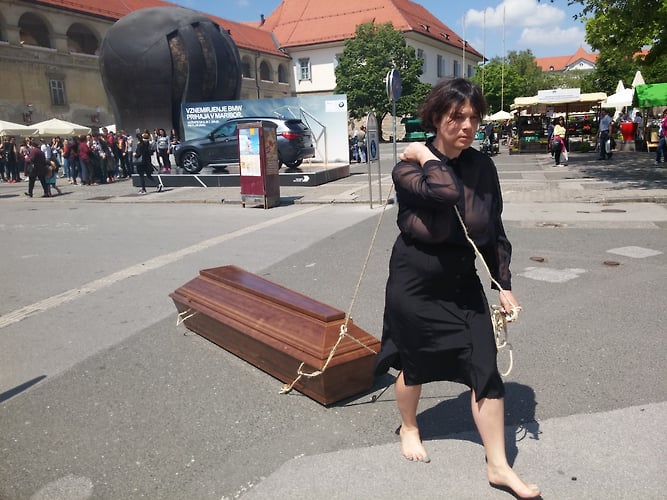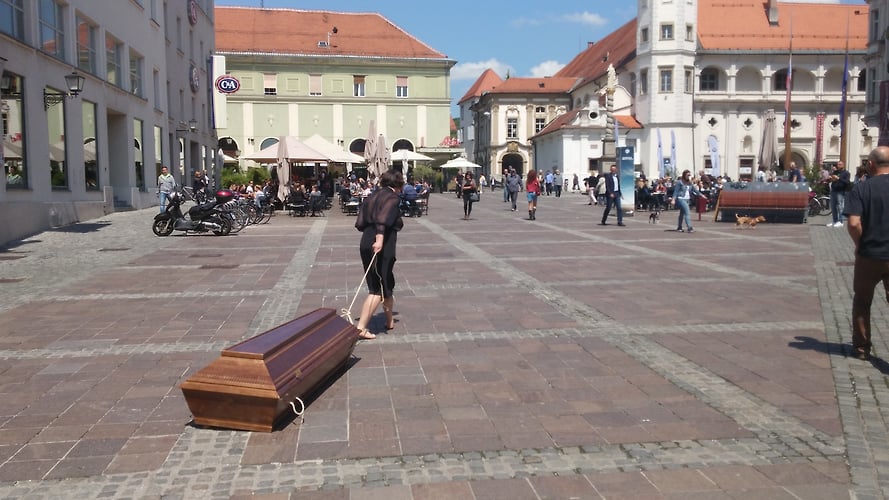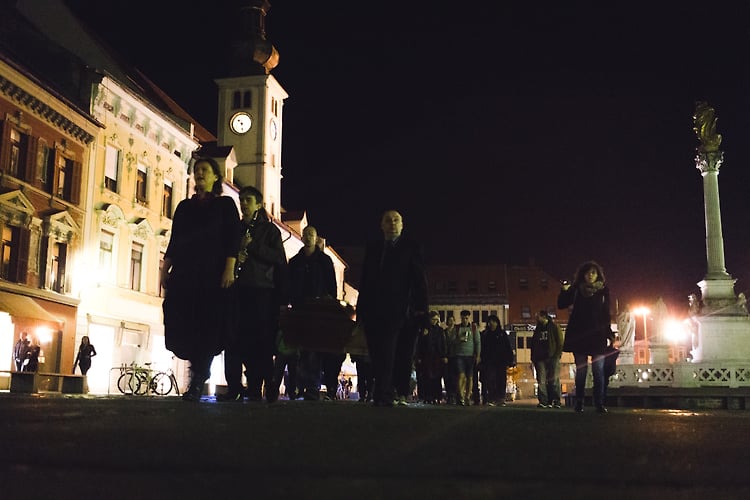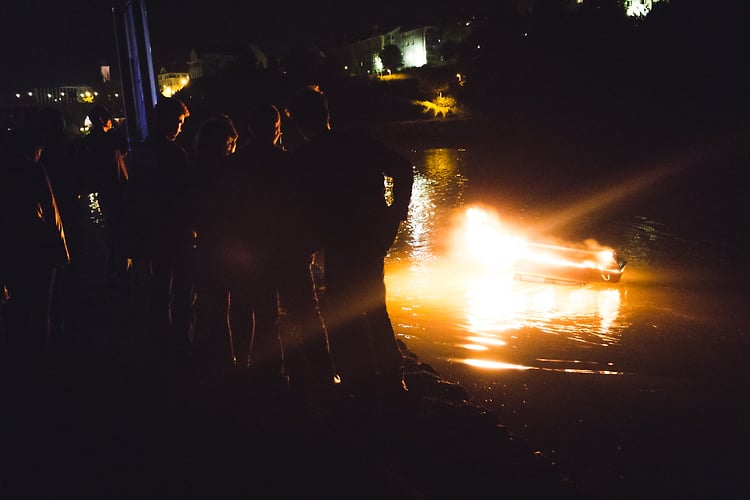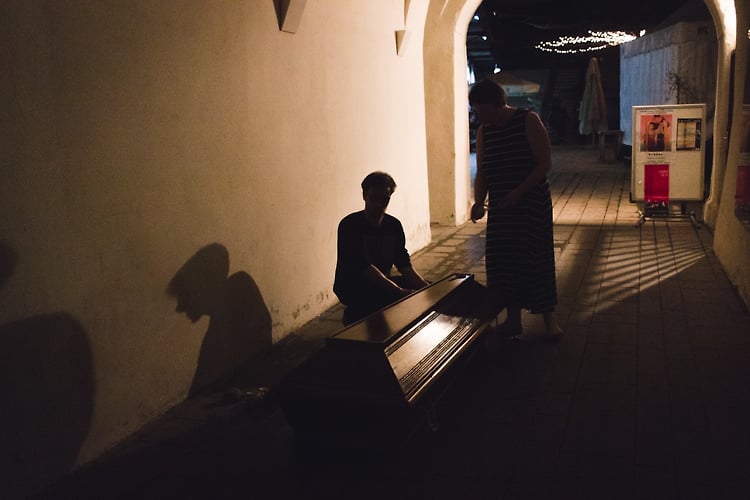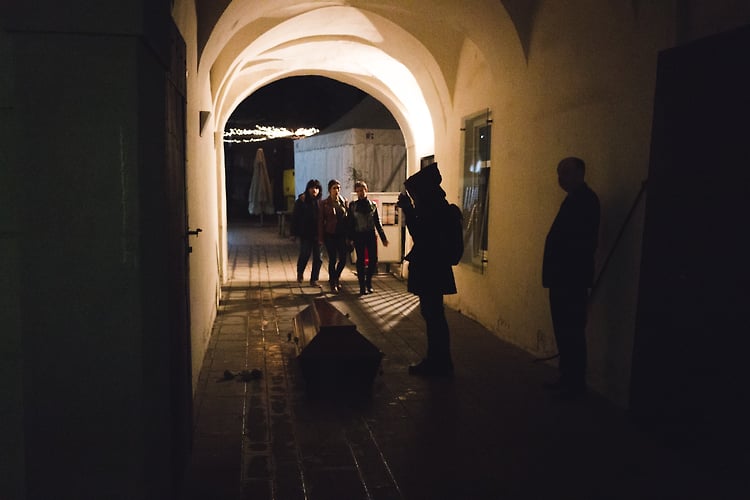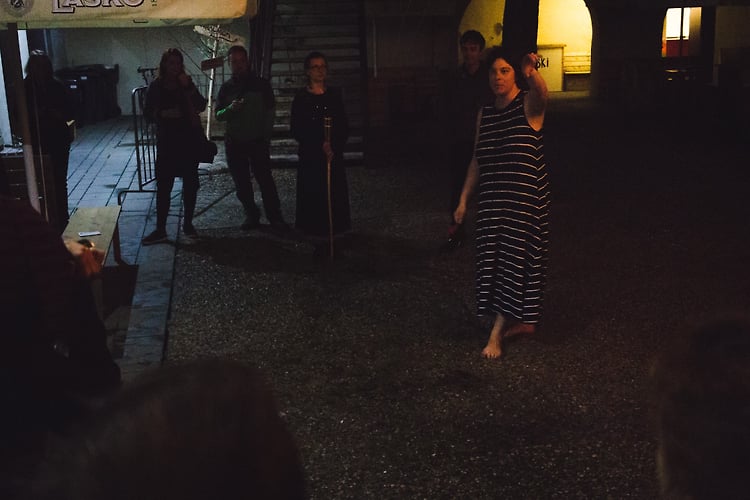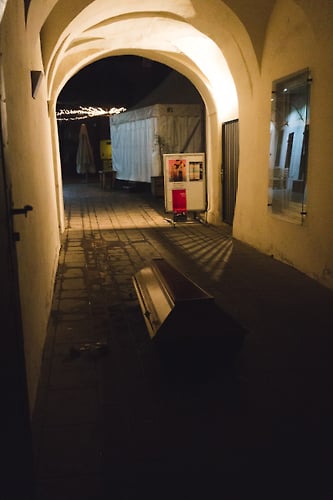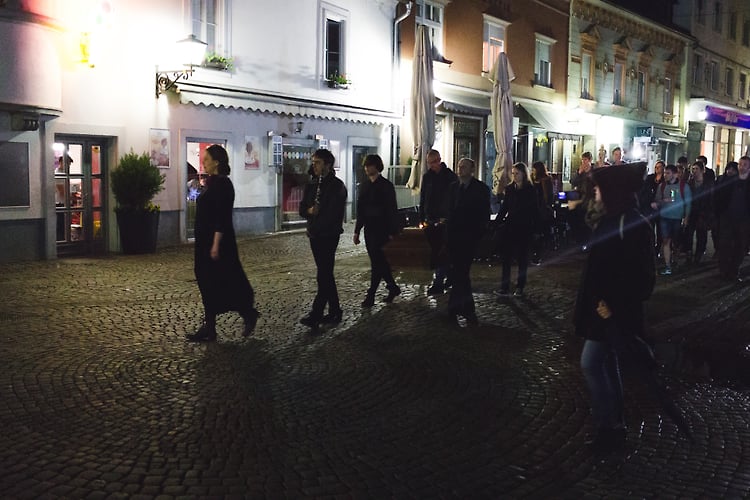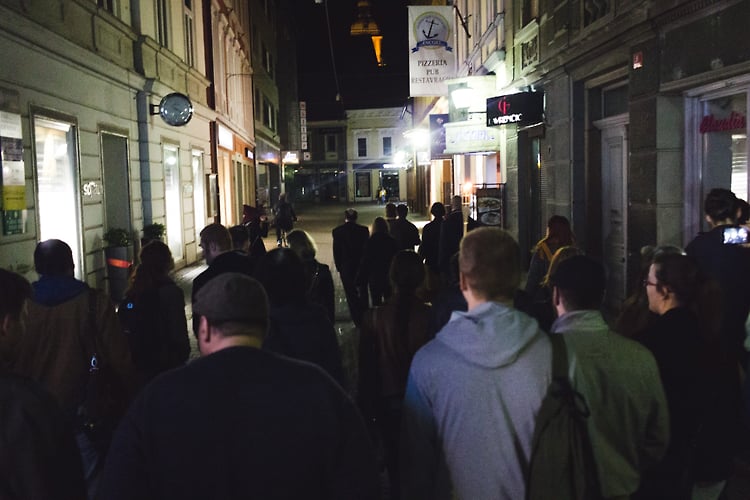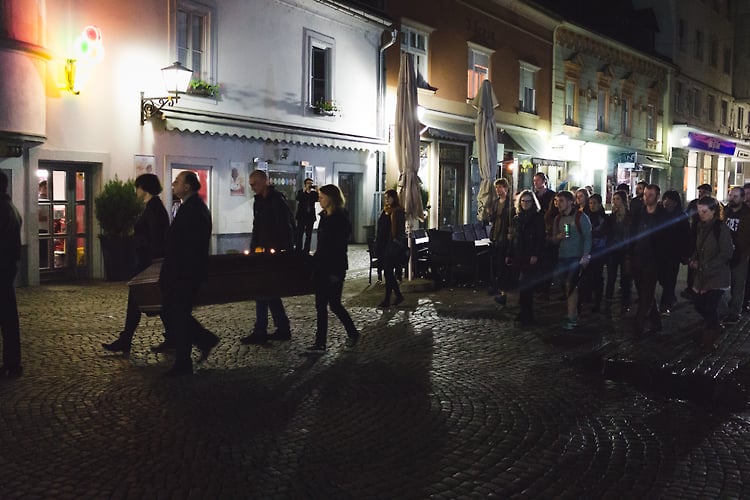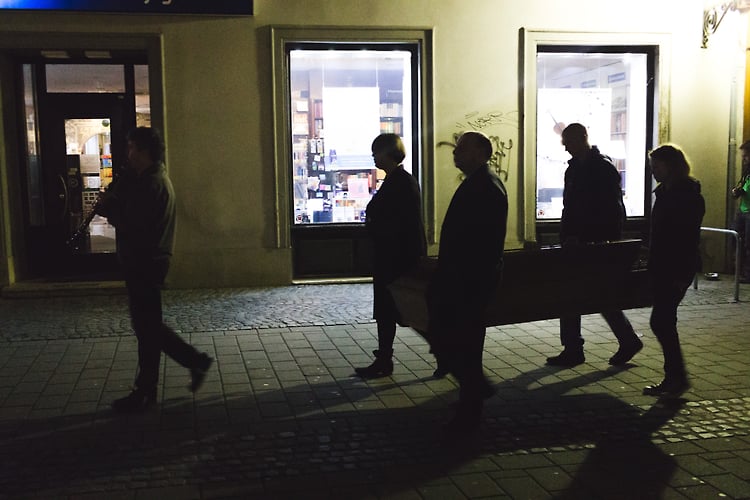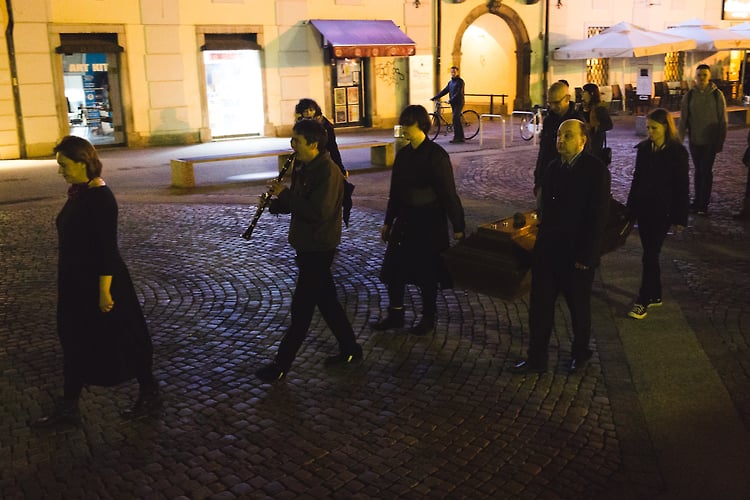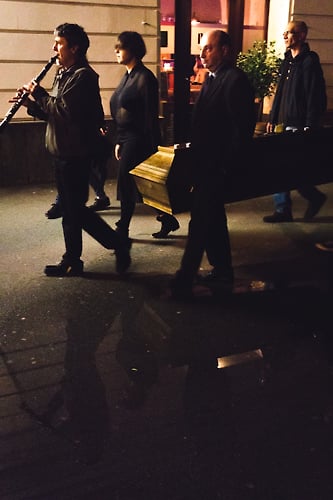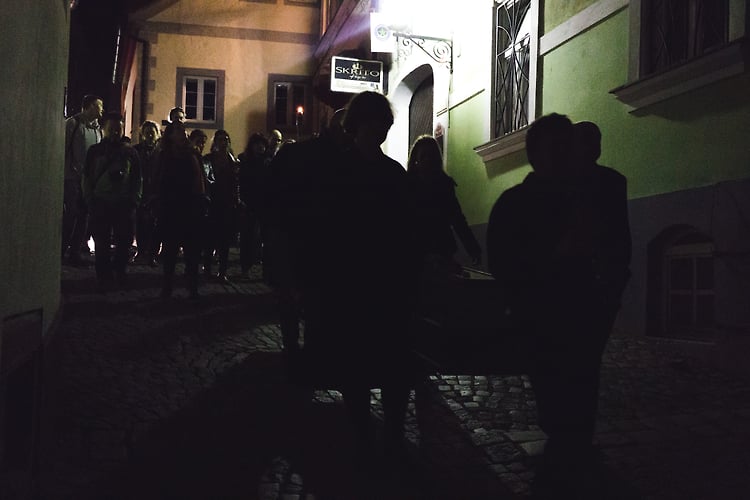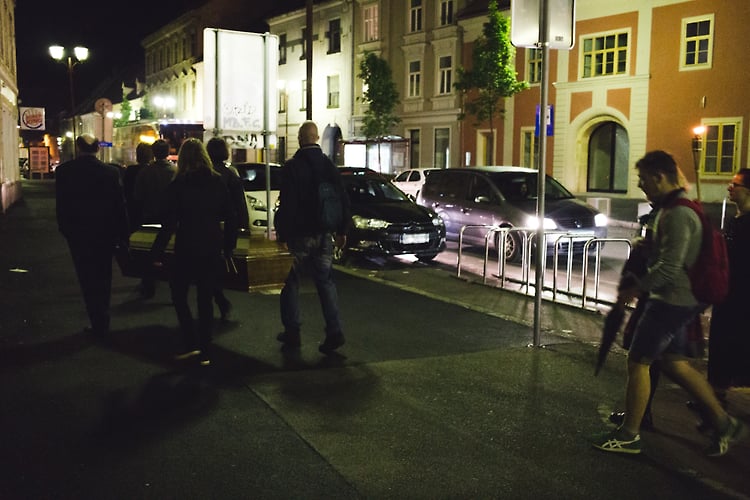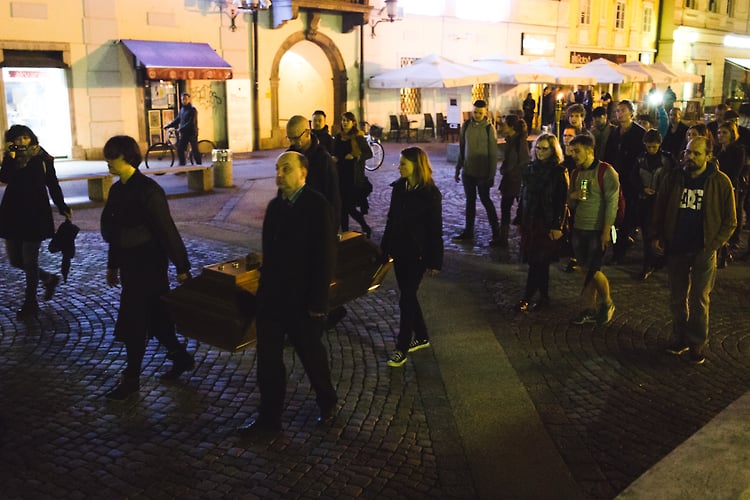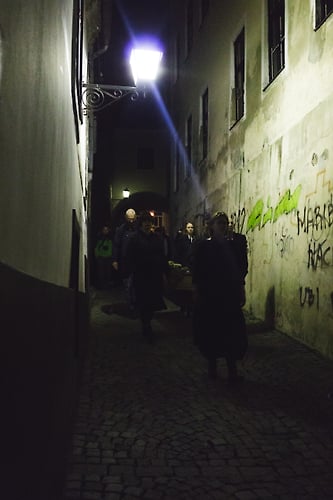MARTINA KARTELO 2016
Martina Kartelo
Funeral to the Poor
Kaja Kraner
In case of the performance by Martina Kartelo, it perhaps makes more sense to focus more on the reception of her work than on the problem she examined during her residency. During her stay in Maribor, the Croatian artist living on Iceland researched the phenomenon of poverty; on the one hand, how poverty is (“objectively”, systemic) generated in the capitalist mode of production and, on the other, what is the subjective perception of poverty and what if not only to the strictly economic status can it relate to. Because of this, the artist focused her research both on statistical data and scientific research and on local informants, who provided data about the manifestations of poverty on the affective level. On the basis of data thus acquired she, in cooperation with local actors, designed a series of performative actions titled Poverty events. These were followed by the final part of the artists’ trilogy about capitalism, consumerism and poverty the Funeral to the Poor.
In one of the performative actions titled Welcome to my poverty, which can also become yours Kartelo has exposed or, better yet, shared especially the subjective and affective aspects of poverty through interacting with viewers on an individual basis in an intimate atmosphere. During this, she additionally intensified the performative situation by literally exposing herself and by using a combination of a smoky room, sound effects, physical proximity and a symbolic “cold shower”, with which she tried to recreate all the contradictory aspects of the phenomenon in the viewer.
In contrast to this, the final performative action titled Funeral to the Poor was decidedly public in nature. It was conceived as a (symbolic) funeral or a funeral ceremony, which took place in the old centre of Maribor the artist and the participants in the funeral procession accompanied the coffin to the banks of Drava River where they ritually burned it. In the action, Kartelo tried to use a play of metaphoric means (fire, coffin, the burning, etc.) to express homage to those, whose (symbolic) dying and death, because of their social and economic status, are denied consideration from the wider society. Because of its public nature, the action attracted a lot of concurrent (e.g. police responding to an anonymous report) and retroactive attention (e.g. a response in a local newspaper titled “A woman was dragging a coffin and roused ghosts in Maribor”).
Martina F. Kartelo is a theatre actress and performer who is lately working on freelance projects which focus on contemporary social issues. During this residency in Maribor, she will explore the issue of poverty, how it appears, what makes it grow as well as how poor and poverty are perceived by capitalistic society and media. The focus will be on the Croatia and Slovenia. She will explore this issue through facts, meeting with people who are at the margin of poverty, talking with them, visiting areas which are being considered to be poor, read articles and explore the issue on the social media. All this will lead to final performance which is titled "Funeral for Poor" and will involve theatre, performance, and music. This project is third and final part of the series of the artistic exploration of capitalism and consumerism.First one was around consumerism and made in the Netherlands, second was around work of Jorge Zontal and his performance group and presented in Croatia. This one, as well as previous ones, will be in collaboration with Iris Kolendić, a Croatian musician and language teacher.
Martina Kartelo: Pogreb revnim
Kaja KranerV primeru performansa umetnice Martine Kartelo se je morebiti bolj kot na njeno v času rezidenčnega bivanja tematizirano problematiko smiselno nekoliko bolj osredotočiti na samo recepcijo njenega dela. Na Islandiji živeča umetnica hrvaškega rodu je namreč v Mariboru raziskovala pojav revščine: po eni strani, kako je ta v kapitalističnem produkcijskem načinu (»objektivno«, sistemsko) generirana, po drugi pa, kakšna je subjektivna percepcija revščine in na kaj vse – če ne zgolj na strogo ekonomski status – se ta lahko nanaša. Iz tega razloga se je umetnica v času snovanja svojih performativnih akcij fokusirala tako na statistične podatke in strokovne raziskave, kot na lokalne izpraševance, preko česar je pridobila podatke tudi o tem, kako se revščina manifestira na afektivni ravni. Na podlagi pridobljenih podatkov je nato v sodelovanju z nekaterimi lokalnimi akterji nastala serija performativnih akcij, naslovljenih Poverty events, katerim je sledil zaključni del umetničine trilogije o kapitalizmu, konzumerizmu ter revščini, naslovljen Pogreb revnim.
V eni od performativnih akcij, naslovljeni Dobrodošli v moji revščini, ki lahko postane tudi vaša, je Kartelo na primer v interakciji s po enim gledalcem na enkrat v intimni atmosferi izpostavila oziroma delila predvsem subjektivne in afektivne vidike revščine. Pri tem je performativno situacijo še zaostrila s tem, da se je dobesedno razgalila ter preko kombinacije zadimljenega prostora, zvočnih efektov, telesne bližine in simbolnega »hladnega tuša« poskušala v gledalcu poustvariti vse kontradiktorne vidike fenomena.
Za razliko od tega se je končna performativna akcija naslovljena Pogreb revnim odvijala v javnem prostoru. Zasnovana je bila kot (simbolični) pogreb oziroma pogrebna ceremonija, ki je potekala po samem centru Maribora, pri čemer so umetnica in sodelujoči v procesiji pospremili krsto do obrežja reke Drave, kjer so jo nato skupaj tudi ritualno zažgali. Kartelo je z akcijo poskušala preko poigravanja z metaforičnimi sredstvi (ogenj, krsta, zažig itn.) izraziti spoštovanje tistim, katerih (simbolno) umiranje in smrt zaradi njihovega ekonomskega in socialnega statusa v družbi tega niso deležni. Akcija je, sploh ker se je odvijala v javnem prostoru, doživela tudi veliko sočasne (policija na podlagi anonimnega klica) in retroaktivne pozornosti (odziv v lokalnem mediju, naslovljen »V Mariboru ženska vlekla krsto in burila duhove«).

